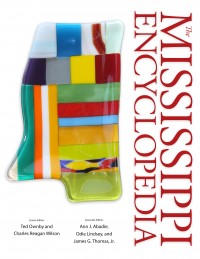Online Version of THE MISSISSIPPI ENCYCLOPEDIA is live
Online Version of THE MISSISSIPPI ENCYCLOPEDIA ready for access
 As of this summer, if you don’t want to lug around the nine-pound Mississippi Encyclopedia, just grab your laptop and the wonders of the state are at your fingertips. The online version of the 1,451-page Mississippi Encyclopedia, a project that began at the Center for the Study of Southern Culture in 2003 and concluded with publication in 2017, is available at https://mississippiencyclopedia.org/.
As of this summer, if you don’t want to lug around the nine-pound Mississippi Encyclopedia, just grab your laptop and the wonders of the state are at your fingertips. The online version of the 1,451-page Mississippi Encyclopedia, a project that began at the Center for the Study of Southern Culture in 2003 and concluded with publication in 2017, is available at https://mississippiencyclopedia.org/.
The Mississippi Encyclopedia includes solid, clear information contained in a single volume, offering with clarity and scholarship a breadth of topics unavailable anywhere else, with entries on every county, every governor, and numerous musicians, writers, artists, and activists. It is the first encyclopedic treatment of the state since 1907.
The volume, published by the University Press of Mississippi, appeals to anyone who wants to know more about Mississippi. It has proven to be especially helpful to students, teachers, and scholars researching, writing about, or otherwise discovering the state, past and present.
Stuart Rockoff, executive director of the Mississippi Humanities Council (MHC), is familiar with the encyclopedia project because he wrote the “Jews” and “Goldring/Woldenberg Institute of Southern Jewish Life” entries. He said he is pleased that the MHC has been able to help make an online version a reality.
“I was excited to learn that the book would finally be published, but was especially interested in creating an online version that would be accessible to students across the state and people all over the world,” Rockoff said. “I later learned that during the early stages of the encyclopedia project there were discussions about creating an online version. I wanted to bring that idea back and offer the Humanities Council’s resources to help make it happen. The online encyclopedia would not be possible without the commitment of the Center and its staff, not to mention their incredible work compiling and editing all of the entries that went into the book.”
Rockoff added that the online version enables the encyclopedia to be a living document, with new entries being added and old ones being updated. “For people outside of our state but interested in our rich history and culture, the online encyclopedia will offer them a wealth of information and analysis,” he said. “For middle school and high school students taking Mississippi History, the online encyclopedia will be an incredible and accessible resource.”
Ted Ownby, director of the Center for the Study of Southern Culture, used the print version of the Encyclopedia in teaching a HST 452: History of Mississippi course at the University of Mississippi and echoed the importance of an online version widening availability for learners. “Using the Encyclopedia as a reference in teaching Mississippi history this spring enabled me to make the course much more distinctive, more about the specific individuals—people and places—rather than generalities, so the online version will be more useful for schools and students doing projects,” Ownby said. “We love the fact that a hardcopy encourages browsing and surprise, and we hope the online version holds the same possibilities for searching for one thing and finding a dozen of things that are equally interesting.”
Ownby said the online version allows for updates of the print version, as well as a chance to make any corrections. “It will have more illustrations because there are no limits on page count and the online version will have a few original documentary films,” he said. “Since the print version came out a year ago a number of things have changed. Senator Thad Cochrane retired, people published new books and received recognition, and several subjects of the entries have died.”
The importance of The Mississippi Encyclopedia has not gone unnoticed, as the book won a Mississippi Institute of Arts and Letters Award, and awards of merit from the Mississippi Historical Society and the Mississippi Heritage Trust.
The Mississippi Encyclopedia is the successful result of numerous collaborations—between the University Press of Mississippi and the Center for the Southern Culture, among the numerous supporters who contributed to or helped organize the project, among the thirty topic editors from around the state and far beyond it, and among the authors, an intriguing mixture of scholars. The Mississippi Humanities Council and the Mississippi Department of Archives and History helped a great deal, and the University of Mississippi Department of History and School of Law joined the Southern Studies program in encouraging advanced students to write for the project. Early support came from the University of Mississippi and the National Endowment for the Humanities.
Each entry in The Mississippi Encyclopedia provides an authoritative but accessible introduction to the topic discussed. It also features long essays on agriculture, archaeology, the civil rights movement, the Civil War, contemporary issues, drama, education, the environment, ethnicity, fiction, folklife, foodways, gender, geography, industry and industrial workers, law, science and medicine, music, myths and representations, Native Americans, nonfiction, poetry, politics and government, the press, religion, social and economic history, sports, and visual art.
Rebecca Lauck Cleary
